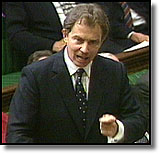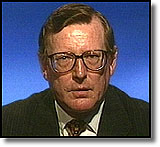
|
Unionists Reject Decommissioning ProposalsUnionist politicians have rejected British and Irish decommissioning proposals at multi-party talks in Belfast. The Ulster Unionists, the Democratic Unionists and the UK Unionists all rejected disarmament plans agreed by ministers in London and Dublin before the IRA ceasefire announcement.The vote came as no surprise but represents a setback to attempts by the two governments to get all sides, including Sinn Fein, around the negotiating table for the start of substantive talks on the future of Northern Ireland on September. Downing Street has insisted that the peace process will not be derailed. The Northern Ireland Secretary Mo Mowlam has said: "The talks process goes on and we will take all necessary steps to ensure it happens."
The more hardline Democratic Unionists and UK Unionists have both demanded the process be scrapped and a fresh start made. They have both warned they will not go back to the talks. But David Trimble's Ulster Unionists have decided to remain inside the talks process even though they voted against the waepons proposals. DUP leader the Reverend Ian Paisley said it would now be impossible for substantive talks to take place. His party was not, he said, prepared to negotiate with gunmen and those who continued to kill and bomb. As he left Castle Buildings, Stormont, he said: "We have now left this particular process because there is nothing in it for unionists or the unionist people and those who believe in law and order." And he added: "The gunmen have taken over the process."
The British and Irish governments had put forward joint proposals recommending that some weapons be given up during the substantive negotiations on the future of Northern Ireland. These are due to begin on September 15. But the Unionist parties had complained about the wording of the proposals.
During Prime Minister's Questions in the House of Commons, Tony Blair said that he was anxious that the parties involved should move on from talking about talks, to the talks proper about the future of Northern Ireland. The Government's position on decommissioning terrorist weapons had not changed, he said. An independent commission would be established on decommissioning in time for the substantive peace talks starting on September 15. Mr Blair welcomed the restored IRA ceasefire but said the Government was "not the slightest bit dewy-eyed" about it and understood the cynicism people in Ulster must feel. Mr Blair has fiercely denied making a secret deal with nationalists. The Northern Ireland Secretary, Mo Mowlam said earlier on BBC Radio 4 that she welcomed the Ulster Unionists' decision not to abandon the talks immediately. She said people elected political parties to solve problems not to walk away from them.
Earlier, the leader of the Ulster Unionist Party, David Trimble, had called for more clarification on the weapons issue. He told BBC Television that the joint proposals were too vague. Once again he doubted the sincerity of the IRA ceasefire. He said they had to make it clear to everyone that they were going to abandon their "war machine". A full session of talks is to take place on Monday, after which negotiations will be adjourned until September. In the interim, the British and Irish governments will try to establish an international commission to oversee the decommissioning process. The unionist parties are insisting upon a written guarantee that weapons will be surrendered as soon as the talking starts.
|
Diana, Princess of Wales, 1961-1997
Conference 97
Devolution
The Archive
News |
Issues |
Background |
Parties |
Analysis |
TV/Radio/Web
Interactive |
Forum |
Live |
About This Site
News |
Issues |
Background |
Parties |
Analysis |
TV/Radio/Web
Interactive |
Forum |
Live |
About This Site
© BBC 1997 |
politics97@bbc.co.uk |


